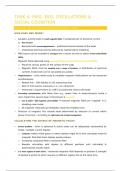Squids - Samenvattingen, Aantekeningen en Examens
Op zoek naar een samenvatting over Squids? Op deze pagina vind je 34 samenvattingen over Squids.
Alle 34 resultaten
Sorteer op
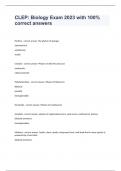
-
CLEP: Biology Exam 2023 with 100% correct answers
- Tentamen (uitwerkingen) • 24 pagina's • 2023
-
Ook in voordeelbundel
-
- €16,12
- + meer info
Porifera - correct answer -the phylum of sponges asymmetrical ectothermic sessile Cnidaria - correct answer -Phylum of Jelly fish and coral exothermic radial symmetry Platyhelminthes - correct answer -Phylum of flatworms Bilateral parasitic hermaphroditic Nematoda - correct answer -Phylum of roundworms Annelida - correct answer -phylum of segmented worms: sand worms, earthworms, leeches bilateral symmetry hermaphrodites Mollusca - correct answer -(snails, clams, squids...
Summary of Task 4 of Methods of Cognitive Neuroscience
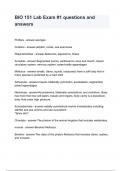
-
BIO 151 Lab Exam #1 questions and answers
- Tentamen (uitwerkingen) • 5 pagina's • 2024
-
Ook in voordeelbundel
-
- €7,81
- + meer info
BIO 151 Lab Exam #1 questions and answers Porifera - answer-sponges Cnidaria - answer-jellyfish, corals, sea anemones Platyhelminthes - answer-flatworms, tapeworms, flukes Annelida - answer-Segmented worms, earthworms; anus and mouth; closed circulatory system; nervous system; setae-bristle appendages Mollusca - answer-(snails, clams, squids, octopuses) have a soft body that in many species is protected by a hard shell Arthopoda - answer-Insects: bilaterally symmetric; exoskeleton; segm...
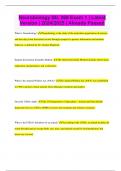
-
Neurobiology BIL 268 Exam 1 | Latest Version | 2024/2025 | Already Passed
- Tentamen (uitwerkingen) • 35 pagina's • 2024
-
- €9,85
- + meer info
Neurobiology BIL 268 Exam 1 | Latest Version | 2024/2025 | Already Passed What is Neurobiology? Neurobiology is the study of the molecular organization of neurons and how they form functional circuits through synapses to process information and mediate behavior, as defined by Dr. Gordon Shepherd. Explain the General Scientific Method. The General Scientific Method includes observation, replication, interpretation, and verification. What is the Animal Welfare Act (AWA)? The Animal We...
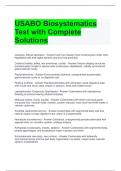
-
USABO Biosystematics Test with Complete Solutions
- Tentamen (uitwerkingen) • 2 pagina's • 2024
-
- €12,70
- + meer info
USABO Biosystematics Test with Complete Solutions Calcarea, Silicea (sponges) - Answer-Lack true tissues; have choanocytes (collar cells-flagellated cells that ingest bacteria and tiny food particles) Cnidaria (hydras, jellies, sea anemones, corals) - Answer-Unique stinging structures (nematocysts) housed in special cells (cnidocytes); diploblastic, radially symmetrical, gastrovascular cavity Plathyhelminthes - Answer-Dorsoventrally flattened, unsegmented acoelomates; gastrovascular cavit...
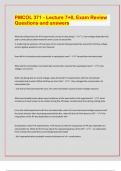
-
PMCOL 371 - Lecture 7+8, Exam Review Questions and answers
- Tentamen (uitwerkingen) • 15 pagina's • 2024
-
- €9,27
- + meer info
PMCOL 371 - Lecture 7+8, Exam Review Questions and answers What two things were the H+H experiments correct in describing? - -1. how voltage-dependent Na and K conductances determined the time course of axonal APs 2. predicting the existence of two types of ion channels that generated the axonal AP and how voltage sensors (gates) worked in such ion channels How did H+H stimulate action potentials in squid giant axon? - -intracellular microelectrode What did the intracellular microelect...
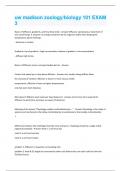
-
uw madison zoology/biology 101 EXAM 3 Questions With 100% Correct Answers.
- Tentamen (uitwerkingen) • 44 pagina's • 2024
-
- €8,20
- + meer info
Basics of diffusion, gradients, and how they relate - Answer-Diffusion: spontaneous movement of very small things. It requires no energy investment by the organism (other than keeping the temperature above freezing) --direction is random Gradients: top of gradient = high concentration, bottom of gradient = low concentration --diffuses high to low Basics of diffusion across a semipermeable barrier - AnswerFactors that speed up or slow down diffusion - Answer-size: smaller things diffuse fas...
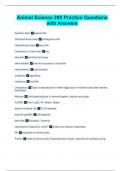
-
Animal Science 200 Practice Questions with Answers
- Tentamen (uitwerkingen) • 3 pagina's • 2024
-
Ook in voordeelbundel
-
- €9,76
- + meer info
Agnatha class jawless fish Chondrichthyes class cartilaginous fish Osteichthyes class bony fish Chambers in a fish heart two labryinth primitive fish lungs swim bladder used for buoyancy in most fish heterothermic cold blooded oviparous egg laying viviparous live birth Oviviparous Type of reproduction in which eggs stay in mother's body after internal fertilization Molusks 2nd largest phylum in animal kingdom. squids and octopi FLAWS Food, Light, Air, Water, Spa...
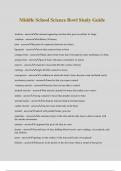
-
Middle School Science Bowl Study Guide
- Tentamen (uitwerkingen) • 7 pagina's • 2024
-
Ook in voordeelbundel
-
- €11,23
- + meer info
Middle School Science Bowl Study Guide skeleton - answerthe internal supporting structure that gives an artifact its shape vertebrae - answerbackbone (26 bones) joint - answerthe point of connection between two bones ligaments - answertissue that connects bone to bone compact bone - answerHard, dense bone tissue that is beneath the outer membrane of a bone. spongy bone - answerpart of bone with many small pores or spaces marrow - answerconnective tissue that fills the cavities of bones c...
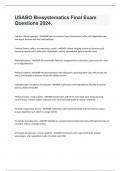
-
USABO Biosystematics Final Exam Questions 2024.
- Tentamen (uitwerkingen) • 3 pagina's • 2024
-
Ook in voordeelbundel
-
- €12,21
- + meer info
USABO Biosystematics Final Exam Questions 2024. Calcarea, Silicea (sponges) - ANSWER Lack true tissues; have choanocytes (collar cells-flagellated cells that ingest bacteria and tiny food particles) Cnidaria (hydras, jellies, sea anemones, corals) - ANSWER Unique stinging structures (nematocysts) housed in special cells (cnidocytes); diploblastic, radially symmetrical, gastrovascular cavity Plathyhelminthes - ANSWER Dorsoventrally flattened, unsegmented acoelomates; gastrovascular cavity ...

Hoe heeft hij dat gedaan? Door zijn samenvatting te verkopen op Stuvia. Probeer het zelf eens! Ontdek alles over verdienen op Stuvia

